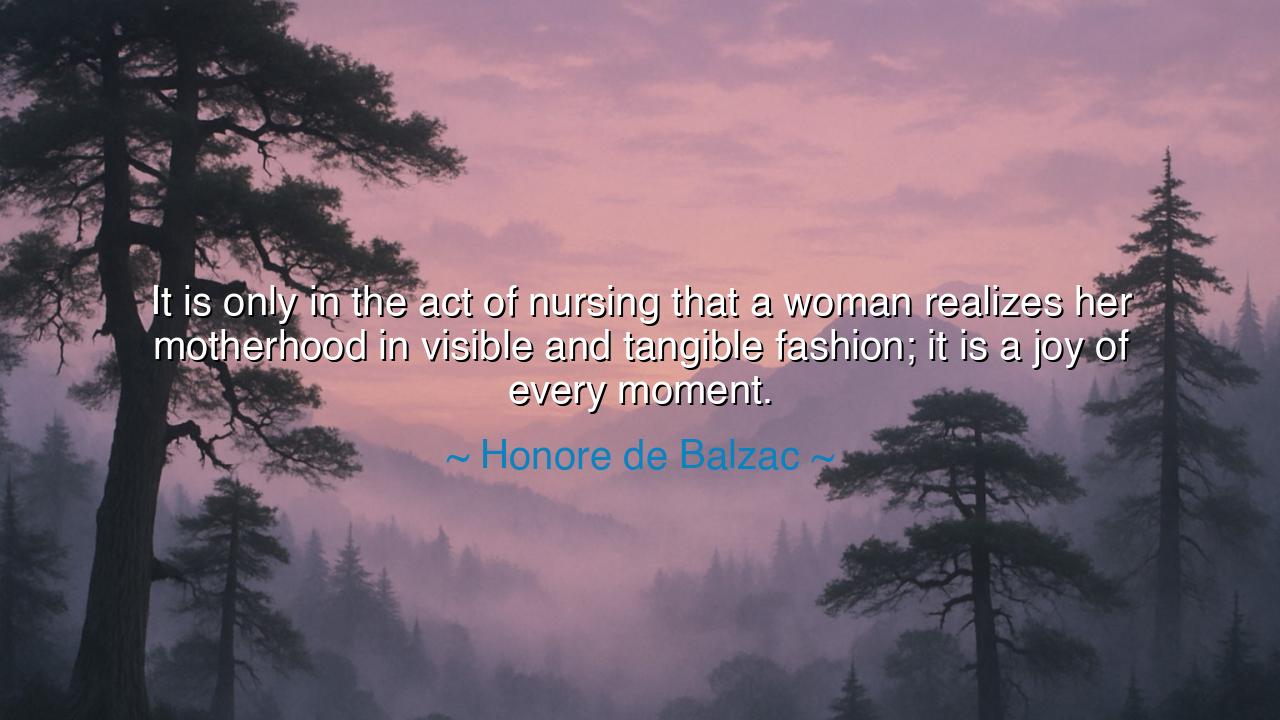
It is only in the act of nursing that a woman realizes her
It is only in the act of nursing that a woman realizes her motherhood in visible and tangible fashion; it is a joy of every moment.






When Honoré de Balzac wrote, “It is only in the act of nursing that a woman realizes her motherhood in visible and tangible fashion; it is a joy of every moment,” he was not simply describing a scene of maternal tenderness — he was unveiling a truth about connection, embodiment, and sacred duty. For Balzac, the act of nursing symbolized the perfect union of love and necessity, of the spiritual and the physical. It was the moment when the abstract idea of motherhood became living, breathing reality. Through this act, the mother does not merely provide sustenance; she communes with the child in the purest expression of creation — feeding life with life itself.
In the wisdom of the ancients, to nourish was to partake in the divine. The Greeks honored Demeter, goddess of harvest and fertility, as the provider of all life, and the Egyptians worshipped Isis, who was often depicted nursing her infant Horus — the embodiment of both tenderness and eternal strength. In Balzac’s words, this timeless image is reborn. The act of nursing becomes not only a symbol of physical care but of spiritual fulfillment — the moment when a woman’s creative power is made manifest, when love ceases to be merely felt and becomes incarnate through touch, warmth, and devotion.
The origin of this quote lies within Balzac’s deep reverence for the emotional and moral forces that shape human life. A keen observer of society, he understood that motherhood was both an exalted calling and a profound labor. In an age where women were often confined to the domestic sphere, Balzac elevated that very sphere into a temple of the sacred. To him, motherhood was not confinement but creation, an art form in which the mother’s body and soul became instruments of grace. Nursing, in particular, represented the highest synthesis of instinct and love — the visible proof of the invisible bond between mother and child.
Yet, there is something more profound still. In his imagery, Balzac speaks not only to mothers, but to all who give of themselves selflessly. The act of nourishing another being — whether through love, guidance, or compassion — is the highest act of humanity. Just as a mother nurses her child, so too does the teacher nourish the mind of a student, the leader nourish the courage of a people, the friend nourish the wounded heart. Each form of nourishment transforms the giver; it deepens empathy, teaches patience, and forges connection. Thus, when Balzac says that a woman “realizes her motherhood” in the act of nursing, he speaks to a larger truth: that we come to understand ourselves fully only through giving.
History offers many mirrors for this truth. Consider Florence Nightingale, the “Lady with the Lamp,” who during the Crimean War tended to the sick and dying with tireless devotion. She was not their mother by blood, but by compassion — her care was the act of nursing writ large, a living embodiment of Balzac’s wisdom. Her strength and sacrifice showed that the joy of giving life and comfort is not limited to the maternal body; it belongs to every soul that chooses to serve. Nightingale, like countless women and men before and after her, demonstrated that love’s greatest joy is found not in possession, but in nurturing the life of another.
Balzac’s words also remind us of presence — of the sacredness of each fleeting moment. “It is a joy of every moment,” he says, for in nursing, the mother is entirely present: body, heart, and spirit intertwined in a single purpose. This is the lesson modern life so often forgets. In our hurry to achieve, to move, to measure, we lose the power of stillness — the awareness that true fulfillment lies in the immediate act of love. To nurse — whether literally or symbolically — is to dwell in the now, to find holiness in the simplest gestures of care.
So, my listener, take this teaching as both reflection and reminder: life’s greatest joy lies not in what we acquire, but in what we give. Whether you are a parent, a friend, a mentor, or a stranger who lends a hand, remember that every act of nurturing draws you closer to the divine. Be present in your giving. Let each moment of care — no matter how small — become your sacred work.
For as Honoré de Balzac teaches, the essence of love is not a grand gesture, but the quiet, continuous offering of oneself. To nurse is to live in communion — to feed another’s need while discovering one’s own humanity. And in that act, whether in motherhood or in mercy, we glimpse the eternal truth: that joy is born not from power, but from tenderness — and that the soul, like the child, grows strongest when it is fed by love.






AAdministratorAdministrator
Welcome, honored guests. Please leave a comment, we will respond soon